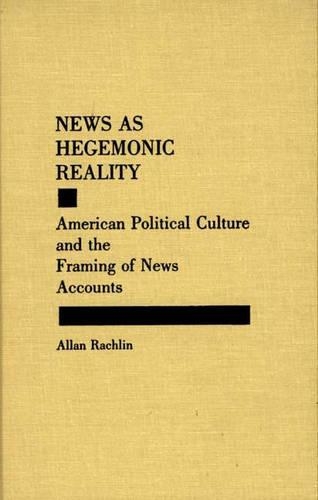
News as Hegemonic Reality: American Political Culture and the Framing of News Accounts
(Hardback)
Publishing Details
News as Hegemonic Reality: American Political Culture and the Framing of News Accounts
By (Author) Allan Rachlin
Bloomsbury Publishing PLC
Praeger Publishers Inc
19th October 1988
United States
Classifications
Tertiary Education
Non Fiction
302.2320973
Physical Properties
Hardback
168
Description
This volume examines the role of political culture, or hegemonic ideology, in defining journalistic accounts of the world. Rachlin contends that a press, free from legal constraints imposed by an oppressive government, can still undermine the possibility of pluralism and the requirements of democracy if it is constrained by its own narrow vision of the world. It is this narrow vision that continues existing social relationships, instead of questioning or changing them, by inhibiting alternative realities. This volume examines the American press to see if it is so constrained and therefore a force that undermines rather than promotes democracy.
Reviews
Rachlin is concerned with examining bias in the mass media that is more deeply imbedded than the biases and limitations of individual journalists or the organizations for which they work. Journalists are theorized as operating within an anti-socialist, anti-Soviet, pro-business hegemonic ideology only dimly perceived, if perceived at all. The study examines how Time, Newsweek, and The New York Times covered the Polish Solidarity movement and the shooting down of a Korean airliner by a Russian pilot. Rachlin makes a strong case that these media exhibited less than a thoroughly questioning attitude in reporting these events. Less convincing is the contention that they were operating in anti-socialist, pro-business blindness. Even less convincing is an attempt to demonstrate this blindness by comparing sympathetic coverage of Solidarity's defiance of Polish law with unsympathetic coverage of a threatened US postal strike and by comparing coverage of the Korean airliner with the shooting down of a Sudanese plane. The US media undoubtedly report within a cultural bias of which many practitioners are dimly aware, but any cultural hegemony that may shape their reporting is likely to be more complex than the anti-socialist, pro-business theory advanced here and not likely to be revealed fully through examination of how three media covered two news events. For advanced students.-Choice
"Rachlin is concerned with examining bias in the mass media that is more deeply imbedded than the biases and limitations of individual journalists or the organizations for which they work. Journalists are theorized as operating within an anti-socialist, anti-Soviet, pro-business hegemonic ideology only dimly perceived, if perceived at all. The study examines how Time, Newsweek, and The New York Times covered the Polish Solidarity movement and the shooting down of a Korean airliner by a Russian pilot. Rachlin makes a strong case that these media exhibited less than a thoroughly questioning attitude in reporting these events. Less convincing is the contention that they were operating in anti-socialist, pro-business blindness. Even less convincing is an attempt to demonstrate this blindness by comparing sympathetic coverage of Solidarity's defiance of Polish law with unsympathetic coverage of a threatened US postal strike and by comparing coverage of the Korean airliner with the shooting down of a Sudanese plane. The US media undoubtedly report within a cultural bias of which many practitioners are dimly aware, but any cultural hegemony that may shape their reporting is likely to be more complex than the anti-socialist, pro-business theory advanced here and not likely to be revealed fully through examination of how three media covered two news events. For advanced students."-Choice
Author Bio
ALLAN RACHLIN is Assistant Professor of Sociology at Bradford College, Massachusettes.
